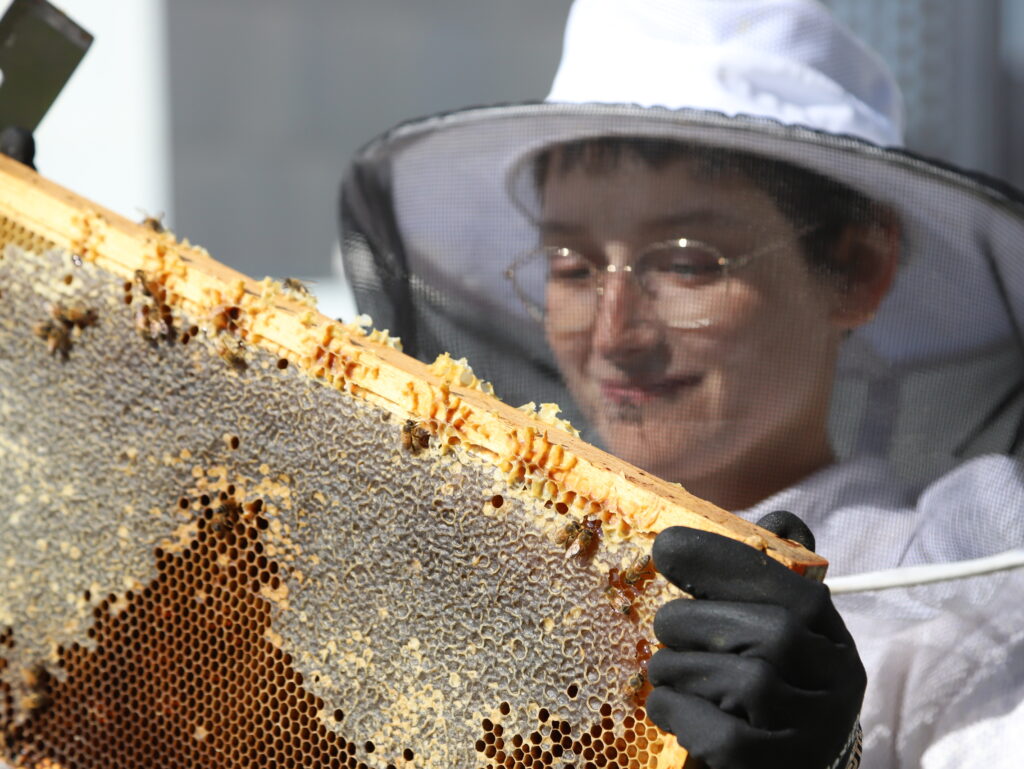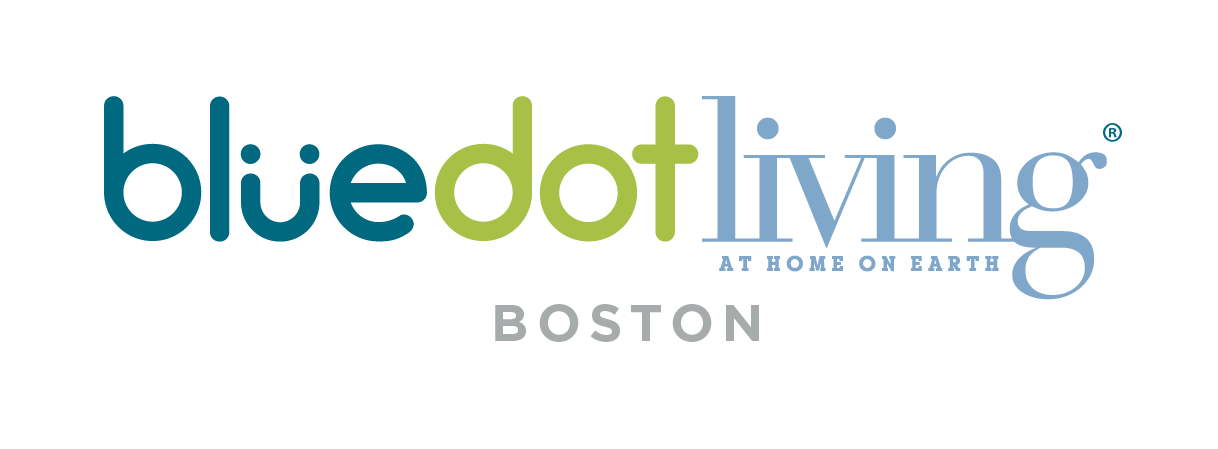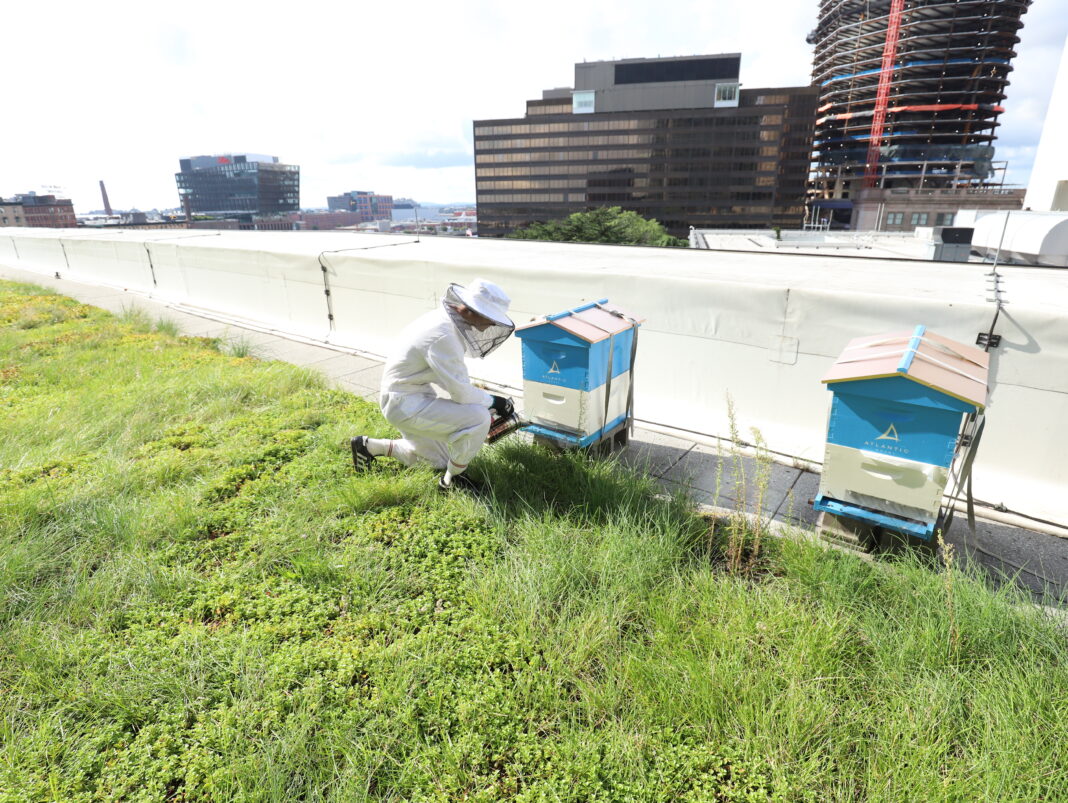Best Bees manages hives in backyards and on corporate rooftops in Boston and beyond.
When I first heard whispers about bee hives being kept on top of the Prudential Center, I was immediately curious. Is there any meaningful pollination for these bees in the urban landscape of downtown Boston? Is the Pru processing honey and beeswax? And, who is doing the beekeeping?
After a few emails and Google searches, I learned that the Best Bees Company was responsible for installing and maintaining these hives. Noah Wilson-Rich started Best Bees in his Boston apartment in 2010 as a way to continue his research in honeybee immunology upon completing his PhD in the topic at Tufts University. Since then Best Bees has grown from a bootstrap operation keeping bees in the Greater Boston area and Provincetown to the nation’s largest beekeeping service, managing hives in 21 cities.
Best Bees installs and manages beehives on both residential and commercial properties. Their clients include homeowners who employ beekeeping services in their backyards as well as large corporations who host hives on their corporate campuses or rooftops. In Massachusetts alone, Best Bees manages more than 600 hives at over 300 residences and more than seventy corporate sites. Businesses hosting hives in Boston include the Atlantic Wharf, Boston College, and the Four Seasons Hotel. “Boston is our headquarters, so we have a lot of pride in some of our longer term sites, like the Prudential Center,” says Paige Mulhern, Creative Director for Best Bees.
“We’re a hands-off approach to beekeeping,” she says. “Our clients technically own the hives, so we’ll put all of that equipment and the bees on their property. What they’re paying for is that maintenance—a beekeeper will come about every three to five weeks, depending on the weather and the needs of the bees, and do all of the tasks that go into beekeeping.”
Mulhern emphasizes that the work they are doing at Best Bees goes far beyond simply maintaining their network of hives: “What makes Best Bees unique, and is really the main part of our mission, is our research.”
Early in their operation, the in-house research team at Best Bees developed a hive tracking software called Buzz. Through this app, beekeepers in the field record all of their hive visits and data on the health of the bees. Best Bees accumulates this data from their network of 21 regions across the country to get a broad sense of how honey bees are doing as a species.
This insight also tells their in-house research team and external research partners a detailed story about the country’s biodiversity and the wellbeing of all pollinators.
“We use different research lenses and research initiatives to leverage this honey bee data as bioindicator data for the larger environment,” Mulhern says. “If we know honey bees are doing well, we can assume other insects and pollinators are doing well. If they’re not doing well, it’s the same situation. So that’s really been our mission from day one—to improve pollinator health through our beekeeping services.”
One of these research initiatives is called Honey DNA. “This is essentially using DNA to look at the protein found in the honey,” Mulhern explains. “We partner with a lab who helps us sequence that pollen protein and sends us a list of what sort of genomic levels are in that pollen, showing what sort of species the bees forage on to make that honey. Once we realized that we were able to do this, we started to shift our focus to enhancing biodiversity.”
With the data collected through their Honey DNA project, the researchers at Best Bees are able to see what foraging resources (i.e., native grasses and flowering plants) are available to their bees. They then make recommendations to their clients to help promote those resources. “We’ve seen a lot of success and impact with clients who are inspired to add gardens and garden beds to their rooftops to support this pollinator oasis,” Mulhern says.
“Our house research team is innovating on the way we report and how we look at the data that we get — for instance, really promoting native plants or promoting plants that other pollinators will benefit from, or noticing times when there isn’t a lot of foraging availability,” Mulhern says. “That has really helped us take a direct action approach to helping our pollinators.”
Continuing research into the global health of pollinators is a core principle for the team at Best Bees. In 2014, they launched a non-profit arm of their operation, the Urban Beekeeping Laboratory & Bee Sanctuary with the goal of managing research programs that promote bee health and provide citizen scientists with resources to bring pollinator protection initiatives into their own communities.
Best Bees is excited to share their data with organizations that may have more resources to make a serious impact. For example, they recently completed a project with NASA and Google Earth where they overlaid the Honey DNA data onto green spaces. Being able to visualize some of the many factors associated with bee health can help researchers develop a better understanding of the complex relationship between honeybees and the environment.

The United States General Services Administration recently hired Best Bees to be part of their pollinator protection initiative at eleven different sites across the country. “Knowing that we are giving data to policymakers and being at the forefront of that change is really exciting,” Mulhern says.
The team at Best Bees shares their findings with more than just research institutions and policymakers. They’re also passionate about educating the general public about how bees are faring and about ways to improve pollinator health around the country. They host frequent webinars to showcase their research, post to their blog, and share information through their social media accounts. “I think it’s really important for the common consumer to stay educated on how we’re looking at our cities to support nature,” Mulhern says. “We need to shift our perspective on our cities and make changes in how we’re developing them.”
Best Bees offers their corporate clients staff events and can package products (honey, balms, wax) the company can give away to staff or their own clients. They keep residential clients informed about all data collected at their hives after every visit.
Best Bees looks forward to continuing to expand their hive network and research partnerships. “The more we can keep bees and pollinators in mind,” Mulhern says, “the richer our landscapes are going to be and the healthier the planet is going to be.”
Interested in installing Best Bees hives at your home or business? Learn more here.






